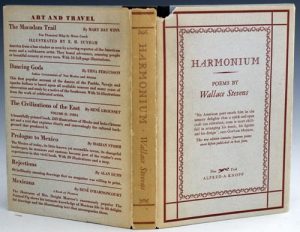Harmonium – Wallace Stevens – 1923

Reviewed by: Bill Date: 30 December 2001
Can poetry replace religion as an object of personal “faith”? Wallace Stevens thought so, and in this collection of exquisitely crafted poetry he attempted to show us how. This collection contains many of his most famous pieces including the much anthogized “The Snow Man”, “Fabliau of Florida”, Anecdote of the Jar” and “Thirteen Ways of Looking at a Balckbird” and perhaps his most famous poem “Sunday Morning”.
In many ways the intensely focused vision and complex word play, which aimed at breaking down the western metaphysical binary between word and thing, epitomize the deeper nature of his poetic vision. While not only breaking new ground in form and voice, Stevens, in these poems, sought to promulgate a view of poetry as deeply subjective and personal as our contact with the world itself. As he later expressed it, his poetry was meant to represent “not Ideas, but the things themselves”.
The Snow Man, for example, is a mediatation on death as a natural part of the unending cycles of being. Although, not a new idea, the way Stevens frames it in such simple language that is made complex by the individual words implied interrelationships, introduce the implication of gaia to the discourse of modernity. Thus, to understand and experience connection to the world itself requires the abandonment of irrational, socialized fears and a willingness to accept death as a natural outcome of life, without deference to hopeful dogma and superstition.
As “The Snow Man” illustrates, Stevens’ message with is expressed throughout Harmonium is simply that by transforming language from mere signifiers into a referential elements grounded in reality, in brute being, one can realize that the same action can be enacted in our individual interactions with each other and the world. Through metaphor and complex word play Stevens shows that the very metaphors that we all live by, simply shroud the apathetic reality that surrounds us and causes many to retreat in horror from. Thus, in a way Stevens poetry, through a redoubling of signification falls back upon itself and reveals that the world and the word are merely one and that neither takes precedence over the other, both informs each other, but only when they are allowed to do so, otherwise we simply continue to delude ourselves and fail to see the actual things that lie in the ideas themselves.















